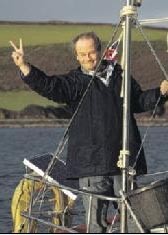Sailor without EPIRB 'found safe' after expensive search
by This is Cornwall/Sail-World Cruising on 2 Jan 2010

Paddy Macklin found safe - photo by This is Cornwall SW
A British sailor feared lost in a fierce Atlantic storm just days into a round-the-world bid phoned home today after hearing on the radio he was missing.
Paddy Macklin set sail in his 27ft yacht from his home town of Falmouth, Cornwall, on December 17 determined to sail the globe without hi-tech gadgets or corporate support.
But last night, he was in trouble with his family – who gave him 'an almighty telling off' for failing to stay in touch – and with British coastguards who said he could have bought equipment to reveal his location for just £250 – saving the massive cost of the search operation.
The 52-year-old – who said he wanted to 'recapture the spirit of true amateurism in sailing' – ran into stormy seas in the Bay of Biscay, off western France and north-west Spain.
His family alerted coastguards when he failed to contact them on his satellite phone, his only state-of-the-art equipment, as planned.
Both French and Spanish coastguards tried but failed to contact him. A Spanish aircraft also took off to investigate the last-known position of Mr Macklin's yacht – the Tessa – but found nothing.
Mr Macklin finally contacted his worried sister Miranda Kelly yesterday afternoon. 'He heard himself on Radio 4 or the World Service,' she said. 'The reason he hadn't phoned was because the weather has been so awful and he didn't want to get the satphone wet.
'He's now sailing for the first time in five days but he's been thrown around like a rock in a washing machine.'
Her brother had been completely unaware of the search for him and had been 'very apologetic that he had caused so much anguish'.
Mr Macklin says he is trying to emulate Sir Robin Knox-Johnston who won the first round-the-world solo race in 1968, when the high tech equipment available now to communicate while sailing did not exist.
However, as pointed out by his family and Coastguards, this is not the 70's, it is the 21st Century, and regardless of his low-tech aspirations, rescuers will put their own lives at risk and governments and volunteers will spend large sums of money when they are called.
One can only hope that when he reaches the Canary Islands, he will spend the £250 necessary to acquire an EPIRB, which will not disrupt his low-tech sailing, but will give his family comfort and potentially save taxpayer expense next time he 'goes missing.'
If you want to link to this article then please use this URL: www.sail-world.com/65033